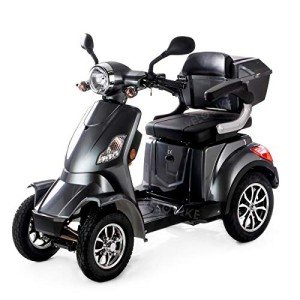Mobility Scooters in the UK: A Comprehensive Guide
In the United Kingdom, mobility scooters are becoming a significantly popular ways of transport for people with mobility concerns, providing them with the liberty to browse their communities separately. These motorized automobiles are developed to help those who have trouble strolling or using a manual wheelchair, using a practical and comfortable solution for day-to-day travel. This post looks into the world of mobility scooter batteries scooters in the UK, exploring their benefits, legal requirements, and how to choose the best one.
Introduction to Mobility Scooters
A mobility scooter is a battery-powered vehicle that generally has 3 or four wheels, a seat for the driver, and handlebars for guiding. They are created to be simple to utilize and keep, making them perfect for older adults and people with specials needs who wish to maintain their independence. Mobility scooters been available in various sizes and designs, each accommodating different requirements and preferences.
Benefits of Mobility Scooters
- Increased Independence: Mobility scooters permit users to take a trip longer distances without the physical pressure related to strolling or utilizing a manual wheelchair. This independence can considerably improve their quality of life.
- Cost-efficient: Compared to other motorized vehicles, mobility scooters are relatively cost effective. They also require minimal upkeep, which can save users a lot of money in the long run.
- Relieve of Use: Most mobility scooters are developed to be easy to use, with user-friendly controls and comfy seating. They are typically light-weight and can be quickly dismantled for transport.
- Improved Social Interaction: By allowing users to venture out more regularly, mobility scooters can help minimize sensations of isolation and solitude, fostering social connections and neighborhood involvement.
- Enhanced Safety: Mobility scooters are geared up with functions such as headlights, brake lights, and horns, making them more secure for use on roads and in public areas.
Types of Mobility Scooters
When choosing a mobility scooter, it's essential to consider the type that best fits your needs. Here are the main types available in the UK:
Class 2 Mobility Scooters:

- Speed: Limited to 4 miles per hour (6.4 km/h)
- Usage: Suitable for pavements and pedestrian areas
- Functions: Compact and lightweight, foldable for simple transport
Class 3 Mobility Scooters:
- Speed: Can reach up to 8 mph (12.9 km/h)
- Usage: Suitable for both pavements and roadways, supplied they are signed up and guaranteed
- Features: Sturdier construct, often with more advanced functions like suspension and larger batteries
Sturdy Mobility Scooters:

- Capacity: Designed to support users weighing as much as 400 pounds (181 kg)
- Usage: Ideal for those who need a robust and long lasting scooter
- Functions: Reinforced frame, broader seat, and enhanced stability
Off-Road Mobility Scooters:
- Terrain: Built to handle rough and unequal surface areas
- Usage: Suitable for users who take pleasure in outdoor activities like treking or fishing
- Functions: All-terrain tires, high ground clearance, and effective motors
Legal Requirements for Mobility Scooters in the UK
Using a mobility scooter in the UK features specific legal obligations. Here are the essential points to think about:
- Registration and Insurance:
- Class 2 Scooters: No registration or insurance needed
- Class 3 Scooters: Must be registered with the DVLA, guaranteed, and show a legitimate MOT certificate if utilized on roads
- Motorist Requirements:
- Age: Users need to be at least 14 years of ages
- Health: No particular health conditions are needed, but users should have the ability to control the scooter safely
- Speed Limits:
- Class 2 Scooters: 4 mph (6.4 km/h) on pavements
- Class 3 Scooters: 8 mph (12.9 km/h) on roads, 4 mph on pavements
- Security Equipment:
- Lights: All scooters utilized on roadways must have front and rear lights, indicators, and a horn
- Reflectors: Required for usage on roadways, specifically throughout low visibility conditions
- Tax and Parking:
- Tax: Class 3 scooters are exempt from vehicle tax
- Parking: Users can park in designated disabled parking spaces with a valid Blue Badge
How to Choose the Right Mobility Scooter
Picking the ideal mobility scooter includes considering several factors:
Mobility Needs:
- Range: How far do you need to take a trip?
- Terrain: Will you be utilizing the scooter on pavements, roads, or off-road?
- Weight Capacity: What is the maximum weight the scooter requires to support?
Budget:
- Initial Cost: Mobility scooters can range from a couple of hundred to several thousand pounds
- Ongoing Costs: Consider the expense of batteries, maintenance, and insurance
Functions:
- Comfort: Look for a scooter with a comfortable seat and adjustable controls
- Storage: Some scooters use extra storage for shopping bags or individual items
- Portability: If you need to transfer the scooter, choose a design that is light-weight and collapsible
Track record and Support:
- Brand: Research trustworthy brand names understood for their quality and reliability
- Guarantee: Check the guarantee period and what it covers
- Consumer Support: Ensure the producer or merchant uses excellent client support and service
Frequently Asked Questions About Mobility Scooters in the UK
Do I require a license to drive a mobility scooter?
- No, you do not need a driving license to operate a mobility scooter in the UK. Nevertheless, Class 3 scooters must be signed up with the DVLA and insured if utilized on roads.
Can I utilize a mobility scooter on the pavement?
- Yes, both Class 2 and Class 3 scooters are enabled on pavements, however Class 3 scooters are limited to 4 mph.
Are there any limitations on where I can use a mobility scooter?
- Class 2 scooters are restricted to pavements and pedestrian areas. Class 3 scooters can be utilized on roadways, but they must meet certain legal requirements.
How do I maintain my mobility scooter?
- Routine maintenance includes inspecting battery levels, tire pressure, and brake performance. It's also important to clean up the scooter regularly and save it in a dry location.
Can I get a mobility scooter through the NHS?
- The NHS offers mobility scooters through the Disabled Living Allowance (DLA) or Personal Independence Payment (PIP). You can likewise buy or rent a scooter from a private merchant.
Is a mobility scooter tax-deductible?
- Sometimes, the cost of a mobility scooter can be claimed as a medical cost. Consult a monetary consultant for particular guidance.
Tips for Using a Mobility Scooter Safely
- Wear Appropriate Clothing:
- Wear comfy and weather-appropriate clothes. Think about wearing a high-visibility coat when using the scooter on roadways.
- Keep the Scooter:
- Regularly examine the battery, tires, and brakes to make sure the scooter is in excellent working condition.
- Follow Traffic Rules:
- Obey traffic signs and signals, and utilize designated pedestrian and cycle paths when possible.
- Use Safety Equipment:
- Always use the headlights, brake lights, and horn, especially during low visibility conditions.
- Bear in mind Others:
- Be courteous to pedestrians and other roadway users. Decrease when approaching congested areas.
Mobility scooters are an important tool for individuals in the UK who face mobility difficulties. They use a range of benefits, from increased self-reliance to improved security, making them a popular choice for older adults and people with specials needs. By comprehending the various kinds of scooters, legal requirements, and how to choose the ideal one, users can delight in the flexibility and convenience these cars supply. Whether for daily errands or recreation, a mobility scooter can significantly enhance the lifestyle for lots of people.
Extra Resources
- DVLA Website: For details on signing up and guaranteeing a Class 3 mobility scooter
- Age UK: Offers suggestions and support for older adults considering a mobility scooter
- Disability Rights UK: Provides guidance on accessing mobility scooters through financial help programs
By making the effort to research study and pick the right mobility scooter, users can enjoy higher self-reliance and a more active lifestyle.








